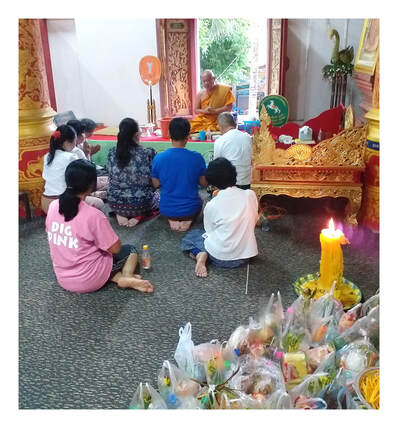|
Thai Halloween is today, wan-pen duan sip-song – full-moon of the 12th month. The reason it is called “Halloween” by those familiar with the Western holiday is that folk-tradition says that on this day ghosts of ancestors (and others) are “released” to wander the earth. The eternal torment of ghosts is hunger. On this one day a year they can come looking for sustenance. It would be a terrible thing if one’s mother or father were to come looking for something to eat and no one had provided anything for them. Dutiful children could not bear the thought. But how is this food to be provided?
Around here it is customary to prepare a traditional northern Thai meal built around sticky rice, a steamed meat and herbal dish, chili paste (green or red), pork curry, and a sweet something such as sticky rice with boiled peanuts inside. The older generation cannot do without mian (fermented tea leaves to chew with crystallized salt) and a cigar. This is brought to the local temple to be first presented to the monks, who accept it with a blessing and then pour water to transfer the blessing to the ancestors. The sacks of food are left at the temple, having been divided between the monks and the ancestors. We do what we can. That is the best that can be done. How this fits into Northern Thai Buddhism is a bit complicated. First, the actual status of ancestors is uncertain. When someone dies their “spirit” or “ghost” tends to be disoriented, but the funeral rituals are to insure that the ghosts “depart” to their destiny. That would be a blissful-heavenly state for those whose accumulated merit warrants such a reward, or punishment in narok which is usually imprecisely translated “hell” but is more like purgatory where accumulated demerit is purged. Then the departed ones are reborn, which is a continued opportunity to acquire merit worthy of being able to achieve the spiritual break-through into the egoless state of enlightenment wherein one breaks out of the endless cycle. Everyone who went to the temple this morning did so in behalf of ancestors who are possibly not yet reincarnated. The ancestors are “working out” their accumulated demeritorious past lives. We cannot be sure about what’s going on with them. It is possible that somehow something done this morning is a help. The food is a contribution to the monks in the temple. That is meritorious. The merit is symbolically transferred to the departed ones. That might hasten things along for them. (Merit transfer is controversial. Strict Buddhism has no room for it. But on this inauspicious day if mother and father are wandering forth ravished with hunger, well, their favorite meal awaits. They may be unable to actually eat it, for such is the punishment of those in narok. But there may be comfort from knowing they are remembered. Or maybe there is some mysterious way they can benefit from real food on this one day of the year. This annual event is one of the best examples of how Buddhist religion and supernaturalism overlap. They are based on entirely separate narratives which at one level are incompatible. But they have been accommodated by each other in a way that satisfies people. One could “feed” the ancestors without involving the temple. Some folk traditions in the region do that. One could provide food for the monks without thinking that ancestors derive any benefit or even still interact with this realm of existence. Providing food for monks is the most significant indicator of one’s participation in Buddhist customs and beliefs. But food in Northern Thai Buddhism is the most meritorious offering one can make. (I think that whereas folks back in Illinois bring flowers (to church on memorial occasions or to funerals) people here in Chiang Mai bring food.) Filial piety is more than obedience out of necessity or duty, or even because of gratitude. On a day like today the element of devotion can be glimpsed. This is not a devotion in which one can “take refuge” and find protection or salvation. This is the sort of awe-struck sense that “something beyond human understanding” is being perceived here.
0 Comments
Leave a Reply. |
AuthorRev. Dr. Kenneth Dobson posts his weekly reflections on this blog. Archives
March 2024
Categories |
| Ken Dobson's Queer Ruminations from Thailand |
|

 RSS Feed
RSS Feed
